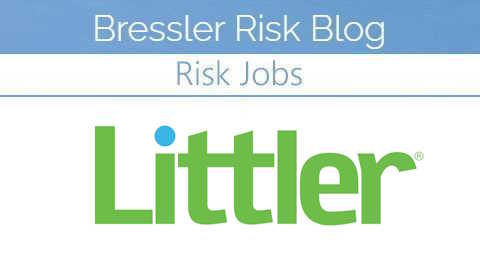Risk Reading Roundup — Law Firm Chief Legal Officer Appointed, Insurance Insight, Big Firm Opinions, DOJ Discovery Fight
Posted on
Hat tip to David Monteiro at Goulston & Storrs for flagging this interesting staff model development: “Adding a New C-Suite Role, Fish & Richardson Hires Chief Legal Risk Officer” —
- “Among one of the latest Big Law leadership hires in Washington, D.C., Fish & Richardson has brought on Elham Dehbozorgi as its chief legal risk officer, a newly created position.”
- “‘The chief legal risk officer is a new role at Fish that reflects the evolving landscape of legal operations and our commitment to effective systems, processes, and technology in conflicts and risk management,’ Chief Operating Officer Kristine McKinney said in a news release.”
- “McKinney also noted that the firm is undergoing ‘significant technological advances.’ In an interview, Dehbozorgi said Fish is investing in a new database and intake system.”
- “As chief legal risk officer, Dehbozorgi will focus on ‘improving process and technology alignment across firm operations,’ Fish said. She will run the complex and risk management departments, overseeing a team of around 50 people, including analysts and some attorneys.”
- ”There’s a lot of things that are comprised within those departments [conflicts and risk management departments]. Obviously conflicts is conflicts, but under risk management, there’s legal compliance, there’s records retention, there’s a sort of miscellaneous variety of risk management components there,’ said Dehbozorgi.”
Outside of the firm, Dehbozorgi was also recently appointed to the legal ethics committee of the D.C. bar.”
A form GC opines: “One-Stop Shopping With Mega-Firms Can Cost More Than It Saves” —
- “Big Law mega-mergers have been accelerating, and just last week the wave continued, as large firms announced three more. They say expanding will allow them to scale operations, add practice areas, compete for talent, reach more markets, and of course, bolster revenue.”
- “These objectives might sound good on paper for clients, but I’m not convinced the trend is in the best interests of in-house legal teams that are looking for high-quality legal work at good prices. Working with mega-firms can present significant tradeoffs.”
- “But in-house legal teams aren’t always well served in a world dominated by mega-firms. I like to shop at Costco, but legal services aren’t as fungible as toilet paper and rotisserie chicken. When I was a general counsel, I really treasured my relationship with terrific outside counsel. They did more than redline documents and file papers; they gave me thoughtful, nuanced, and practical advice that saved me from making critical mistakes. Those are savings that don’t show up on any balance sheet.”
- “Running a conflicts check with a small firm used to be a routine email to the other 30 partners, but with a mega-firm it practically requires artificial intelligence. You might negotiate a 15% discount off the shelf hourly rate by reducing the number of firms you do business with, but then hit a conflicts problem that leads you back to the same firms you left.”
- “And are you really saving money by consolidating work with a few big firms? In my experience, big firms aren’t terribly efficient, and their rates are often higher to begin with.”
- “Don’t get me wrong—big firms can be excellent partners and provide great value to your in-house legal team. Depending on your legal needs and the capabilities of the lawyers involved, one-stop shopping might work. You might find that reducing the number of outside firms you work with does bring efficiencies.”
Solo/Small-firm focused, but fascinating for those interested in the malpractice insurance landscape: “A Primer on Prior Acts Coverage for the Solo and Small Firm Attorney” —
- “Prior acts coverage (PAC) is a feature of claims-made malpractice insurance policies. Its purpose is to provide protection for claims that arise from missteps that occurred before your current malpractice policy’s effective date, as long as the claim is made and reported during your current policy period. PAC is particularly important for attorneys because an alleged error or omission may not come to light until years after the legal services were rendered. Without PAC, there would be no coverage for any claim involving an alleged misstep that occurred before the effective date of your current policy, potentially leaving you personally liable for substantial legal costs and damages.”
- “A lateral move can also unintentionally create a coverage gap if you ignore the issue of PAC. Some law firms purchase a special endorsement that provides retroactive coverage for lateral hires. However, many more refuse to provide PAC because they want to avoid assuming any liability for your prior acts.”
- “The good news is you often have two options if PAC will not be available at your new firm. If the firm you are about to depart will remain a viable entity for the foreseeable future and will continue to be insured, you will continue to have coverage for work done while at your prior firm under former attorney language in that firm’s policy. The decision would then be to rely on that coverage. If this isn’t the case, the other option would be to purchase an individual ERP from your current carrier if available. Of course, if the firm you are leaving is in the process of closing, most of the time the firm will decide to purchase an ERP, which would take care of any coverage concerns.”
“Jackson Walker Fights DOJ’s Discovery Pursuit of Ethics Counsel” —
- “Jackson Walker LLP is fighting to protect communications with its ethics lawyers from a motion to turn over documents filed by the Justice Department’s bankruptcy watchdog, citing attorney-client privilege.”
- “The discovery dispute is part of an effort by the US Trustee to challenge Jackson Walker’s fees in 33 bankruptcy cases involving former bankruptcy judge David R. Jones, who resigned from the US Bankruptcy Court for the Southern District of Texas last year after admitting to a relationship with a onetime Jackson Walker partner.”
- “The Texas law firm previously provided the US Trustee with memos written by Holland & Knight LLP attorney Peter Jarvis about the romance between Jones and Elizabeth Freeman, who worked for Jackson Walker until late 2022. Jackson Walker hired Jarvis as ethics counsel when in 2021 it learned of the relationship.”
- “Jackson Walker gave those memos to the US Trustee because they weren’t protected by attorney-client privilege, but other communications with Jarvis and another Portland-based Holland & Knight lawyer, Jacqueline Harvey, are protected, Jackson Walker said.”
- “The US Trustee is pursuing depositions of Harvey and Jarvis and document discovery of communications between Jackson Walker and Holland & Knight about the Jones-Freeman romance.”
- “Attorney-client privilege didn’t apply to the memos that the firm previously provided because Jackson Walker waived that privilege when it sent the memos to Freeman’s attorney, the firm said.”
- “‘To put it simply—JW produced the Memos because it was obligated to under the Federal Rules,’ it said. ‘JW would have preferred not to have produced those documents.'”









